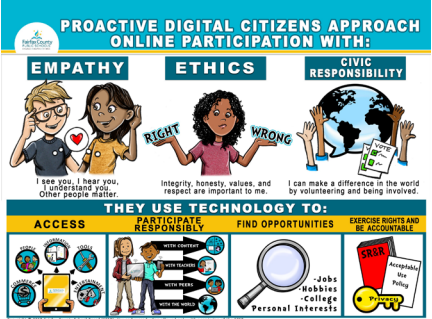Building a Culture of Shared Responsibility
Digital Citizenship Week is coming October 15th – 19th! This year’s focus is on Building a Culture of Shared Responsibility. Each day during the week, schools and parents/caregivers can take simple steps to get in sync and partner together to educate and support students with digital life. Below, you’ll find materials for both home and school for the week. Monday through Wednesday offers complementary activities and conversations that can begin at school and extend into the home. On Thursday and Friday, instructional staff and parents are provided the same simple strategies that can be used at home and at school to support students. A common message from trusted adults has a big impact on kids! We hope Digital Citizenship Week will spark some educationally valuable conversations that can be promoted and supported all year long, by both parents and teaching staff.
Monday @ Home: Shared Responsibility
Consider the following:
- What can your family commit to doing at home with your children to best support your children’s school in providing a safe, positive online learning environment for everyone?
- How does using technology at home with your child provide opportunities for you to teach them about digital citizenship and for your child to demonstrate positive digital citizenship?
The past decade has seen an exponential increase in digital tools and opportunities, which carry the need for students to master a new set of life skills for behaving safely, ethically and responsibly online. Students are much more likely to understand good digital citizenship – the norms of appropriate, responsible technology use – when teachers and parents/trusted adults model it and explicitly teach and promote it on a regular basis.
- Helen Crompton, Old Dominion University
Parents Take Action:
Regularly ask your child to log in and show you the digital tools they use at school and at home.
- How are your household expectations for technology use working? It's a great time to review and revise them with your child. Device Contracts, Media Agreements and Tip Sheets are available to support the conversation. (Translations included)
- Parents can actively model and explicitly teach their children good digital citizenship practices. One of the most effective ways for parents/caregivers to support their children is to actively help them understand, interpret, and respond appropriately to the content, contact, and conduct they experience online together. Did you know...?
- Android Users: If your family uses Android devices, Google’s Family Link can help you set certain digital ground rules,manage apps, keep an eye on screen time and remotely lock your child’s device.
- Apple Users: If your family uses Apple devices, Apple Families provides tools that let parents know, and feel good about, what kids are doing with their devices.
Tuesday @ Home: Healthy Habits
Healthy Habits for Screen Time at Home Learn about what matters most when it comes to screen time.
- This short article from Common Sense Media provides great advice.
- Try this experiment to build awareness of how much screen time you’re really getting.
- Check out these screen time parenting tips from Common Sense Media.
Parents Take Action
-
Identify some healthy ideas from the resources that resonate and make adjustments as needed in your household today.
-
Incldude your child in selecting ways the family can improve healthy habits for technology use at home.
- Device Free Dinners are an easy way to make a small change with big returns!
Wednesday @ Home: Using Media to Build Character
Our students are facing a future full of big problems to solve. Empathy, ethics and a sense of civic responsibility is more important than ever. Digital tools, books, movies, information, and apps - while not the answer to inspiring empathy - can help students gain another perspective, collaborate with others, and design solutions to meet the needs of today’s world.
Parents Take Action
Invest 10-15 minutes exploring these resources. Select at least one to try in your household today.

Thursday @ Home and School: Supporting Student Thinking
Are we speaking the same language?
When school staff and parents speak the same language, it makes a strong impression on kids. Here’s a simple strategy that both parents and school staff can use to help students think through their actions online and consider the impact on themselves, others, and your family or school.
Use this strategy to support positive behaviors that you notice, too!
Parents & Teachers Take Action:
View it:
Try it:
The next time your child or student is facing a digital dilemma and doesn’t know what to do or has undesirable behavior in relation to their online activity, give the Spectrum Strategy a try.
Reflect:
How did using this strategy change how this conversation might have gone? How does this strategy honor the complexity of choices children face and how did it support the child's thinking?
Friday @ Home and School: Handling Haters, Trolls, and Cyberbullies
Have you ever heard kids say “I don’t want to be a snitch?” You might also know children who go straight to an adult to resolve their conflicts with peers instead of problem solving for themselves. Others stay silent and fearful when being treated in an unkind way.
How can adults support children in knowing when digital drama rises to a level that should be reported?
These resources and strategies can help students understand how online haters, trolls and cyberbullies might be impacting them and provides action steps for students to take accordingly. Check out these video links to learn more.
Cyberbullying Haters, and Trolls
Parents & Teachers Take Action:
- Share a story about a time when someone did something hurtful to you on social media. How did it make you feel, and how did you deal with it? Help students understand ways they can rate the severity of the behavior and what action steps they can take.
- Tips for helping someone in crisis: https://www.fcps.edu/ student-wellness-tips/help-in-crisis
- Having a contact card on your child’s mobile device in case they need help a good idea. Consider adding these numbers to your children's phones if they have one:
- When you are at school:
- Text NEEDHELP to 85511 – Hit send
- If you are not at school you can:
- Call Crisis Link at (703) 527-4077.
- Text NEEDHELP to 85511
- Call 911

